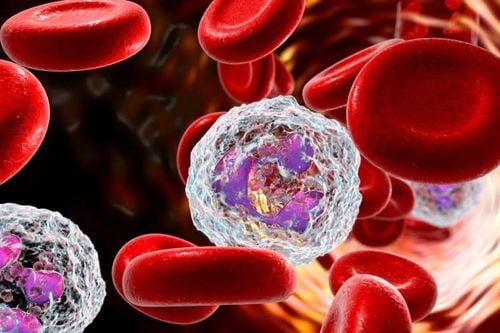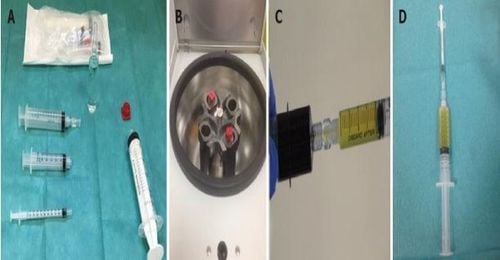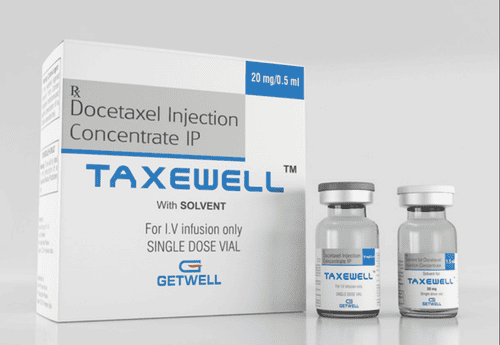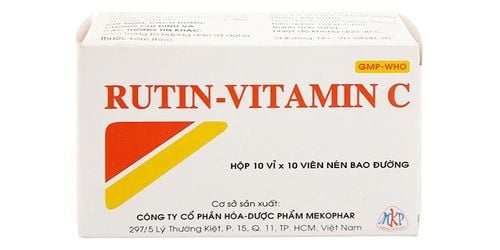This is an automatically translated article.
Immune thrombocytopenic purpura may not cause any symptoms or may have symptoms that are easily confused with other conditions. Therefore, if there is no knowledge about autoimmune thrombocytopenia, the disease will be detected late and the risk of complications is very high.1. Signs of autoimmune thrombocytopenic purpura
Immune thrombocytopenic purpura, also known as idiopathic thrombocytopenia, is an autoimmune condition in which a blood clotting disorder causes the body to bruise or bleed easily for no apparent reason. The disease results from abnormalities in low levels of blood-clotting cells called platelets.Autoimmune thrombocytopenic purpura is a disease that can affect both children and adults. According to experts, thrombocytopenic purpura in children often begins after a viral infection and can completely recover on its own without treatment. However, in older patients, the disorder is often chronic and more difficult to treat.
2. Symptoms of autoimmune thrombocytopenic purpura

Chảy máu cam không rõ nguyên nhân là một trong những triệu chứng của xuất huyết giảm tiểu cầu
Easy bruising or rash Bleeding under the skin , petechiae that look like a rash but are small or just small red purple spots The person may bleed for a long time at the skin cuts Have unexplained nosebleeds Frequent bleeding from the teeth gums and blood in stools or urine Constantly feeling headache, tired Although not a life-threatening illness immediately, patients with idiopathic thrombocytopenic purpura if it is necessary to go to the doctor Hospital for examination and treatment as soon as the following symptoms are present:
Bleeding that cannot be stopped Bleeding spots are widespread and have serious signs.
3. Complications of immune thrombocytopenic purpura
One of the biggest complications of immune thrombocytopenic purpura is bleeding, especially bleeding in the brain, also known as intracranial hemorrhage, which can be fatal. fast. In addition, patients with autoimmune thrombocytopenic purpura are also at risk of complications when using drugs to treat severe or chronic thrombocytopenic purpura. One of the commonly used drugs to treat patients with immune thrombocytopenia is corticosteroids, however, long-term use of corticosteroids can cause serious side effects such as osteoporosis. , high blood sugar, cataracts and can lead to type 2 diabetes. Complications during the treatment of idiopathic thrombocytopenic purpura can also occur with splenectomy (usually indicated when corticosteroids are ineffective), which increases the risk of infection in the patient. In some cases, a baby will be born with a low platelet count. Some other complications that can occur with pregnant patients such as heavy bleeding during delivery.4. How dangerous is immune thrombocytopenia bleeding?

Nên tránh sử dụng các loại thuốc có khả năng làm suy yếu tiểu cầu
Autoimmune thrombocytopenic purpura has a different progression between adults and children, about 70% of children with the disease can recover on their own after 3 months, 30% turn into chronic. In adults, the disease will progress to chronic very quickly and often have many recurrences.
To ensure safety, patients with immune thrombocytopenic purpura can control the risk of bleeding and complications by making lifestyle changes, specifically:
Avoid using drugs that can make you sick. weaken platelets Limit the use of alcohol, stimulants that can affect blood clotting. If you play sports, you should choose sports with light activity. Develop a scientific diet, get proper rest. Periodic health check-ups and use of medication under the guidance of a doctor. Early treatment reduces the risk of serious disease progression. Therefore, when there is thrombocytopenia bleeding, patients can visit Vinmec Health System hospitals nationwide for timely advice and treatment.
Vinmec International General Hospital is a high-quality medical facility in Vietnam with a team of highly qualified medical professionals, well-trained, domestic and foreign, and experienced.
A system of modern and advanced medical equipment, possessing many of the best machines in the world, helping to detect many difficult and dangerous diseases in a short time, supporting the diagnosis and treatment of doctors the most effective. The hospital space is designed according to 5-star hotel standards, giving patients comfort, friendliness and peace of mind.
Please dial HOTLINE for more information or register for an appointment HERE. Download MyVinmec app to make appointments faster and to manage your bookings easily.













